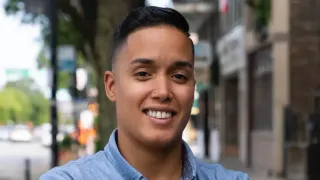
5 hours ago
Trump's Quest for the Nobel Peace Prize Falls Short Again Despite High-Profile Nominations
Mike Pesoli and Michelle L. Price READ TIME: 5 MIN.
President Donald Trump was passed over for the Nobel Peace Prize on Friday despite jockeying from his fellow Republicans, various world leaders and — most vocally — himself.
Venezuelan opposition leader María Corina Machado was awarded the prize. The Norwegian Nobel Committee said it was honoring Machado “for her tireless work promoting democratic rights for the people of Venezuela and for her struggle to achieve a just and peaceful transition from dictatorship to democracy.”
Machado, however, said she wanted to dedicate the win to Trump, along with the people of her country, as she praised the president for support of her cause.
The White House responded bitterly to the news of the award Friday, with communications director Steven Cheung saying members of “the Nobel Committee proved they place politics over peace" because they didn't recognize Trump, especially after the Gaza ceasefire deal his administration helped strike this week.
“He has the heart of a humanitarian, and there will never be anyone like him who can move mountains with the sheer force of his will,” Cheung wrote on social media.
The White House did not comment on Machado's recognition, but Trump on social media shared Machado's post praising him.
Her opposition to President Nicolás Maduro in Venezuela aligns with the Trump administration's own stance on Venezuela, and Secretary of State Marco Rubio previously praised her as “the personification of resilience, tenacity, and patriotism.”
Trump, who has long coveted the prestigious prize, has been outspoken about his desire for the honor during both of his presidential terms, particularly lately as he takes credit for ending conflicts around the world. The Republican president had expressed doubts that the Nobel committee would ever grant him the award.
“They’ll have to do what they do. Whatever they do is fine. I know this: I didn’t do it for that. I did it because I saved a lot of lives,” Trump said Thursday.
Although Trump received nominations for the prize, many of them occurred after the Feb. 1 deadline for the 2025 award, which fell just a week and a half into his second term. His name was, however, put forward in December by Republican Rep. Claudia Tenney of New York, her office said in a statement, for his brokering of the Abraham Accords, which normalized relations between Israel and several Arab states in 2020.
Jørgen Watne Frydnes, chair of the Norwegian Nobel Committee, said the committee has seen various campaigns in its long history of awarding the peace prize.
“We receive thousands and thousands of letters every year of people wanting to say what for them leads to peace,” he said. “This committee sits in a room filled with the portraits of all laureates, and that room is filled with both courage and integrity. So we base only our decision on the work and the will of Alfred Nobel.”
The peace prize, first awarded in 1901, was created partly to encourage ongoing peace efforts. Alfred Nobel stipulated in his will that the prize should go to someone “who shall have done the most or the best work for fraternity between nations, for the abolition or reduction of standing armies and for the holding and promotion of peace congresses.”
Three sitting U.S. presidents have won the Nobel Peace Prize: Theodore Roosevelt in 1906, Woodrow Wilson in 1919 and Barack Obama in 2009. Jimmy Carter won the prize in 2002, a full two decades after leaving office. Former Vice President Al Gore received the prize in 2007.
Obama, a Democrat who was a focus of Trump's attacks well before the Republican was elected, won the prize early in his tenure as president.
“They gave it to Obama for doing absolutely nothing but destroying our country,” Trump said Thursday.
As one of his reasons for deserving the award, Trump often says he has ended seven wars, though some of the conflicts the president claims to have resolved were merely tensions and his role in easing them is disputed.
But while there is hope for the end to Israel and Hamas’ war, with Israel saying a ceasefire agreement with Hamas came into effect Friday, much remains uncertain about the aspects of the broader plan, including whether and how Hamas will disarm and who will govern Gaza. And little progress seems to have been made in the Russia-Ukraine war, a conflict Trump claimed during the 2024 campaign that he could end in one day.
As Trump pushes for peaceful resolutions to conflicts abroad, the country he governs remains deeply divided and politically fraught. Trump has kicked off what he hopes to be the largest deportation program in American history to remove immigrants living in the U.S. illegally. He is using the levers of government, including the Justice Department, to go after his perceived political enemies. He has sent the military into U.S. cities over local opposition to stop crime and crack down on immigration enforcement.
He withdrew the United States from the landmark Paris climate agreement, dealing a blow to worldwide efforts to combat global warming. He touched off global trade wars with his on-again, off-again tariffs, which he wields as a threat to bend other countries and companies to his will. He asserted presidential war powers by declaring cartels to be unlawful combatants and launching lethal strikes on boats in the Caribbean that he alleged were carrying drugs.
The full list of people nominated is secret, but anyone who submits a nomination is free to talk about it. Trump's detractors say supporters, foreign leaders and others are submitting Trump's name for nomination for the prize — and announcing it publicly — not because he deserves it but because they see it as a way to manipulate him and stay in his good graces.
The office of Israeli Prime Minister Benjamin Netanyahu, who this summer said he was nominating Trump for the prize, on Friday reposted Cheung’s response with the comment: “The Nobel Committee talks about peace. President @realDonaldTrump makes it happen.”
“The facts speak for themselves,” Netanyahu's office said on X. “President #Trump deserves it.”
Russian President Vladimir Putin, who sent troops to Ukraine in 2022 and has sought to show alignment with Trump, told reporters in Taijikistan on Friday that it’s not up to him to judge whether Trump should have received the prize, but he praised the ceasefire deal for Gaza.
He also criticized the Nobel Committee’s prior decisions, saying it has in the past awarded the prize to those who have done little to advance global peace.
Putin's remarks nearly echoed the comments Trump made about Obama, and the U.S. leader responded to his Russian counterpart's praise by posting on social media: “Thank you to President Putin!”
Others who formally submitted a nomination for Trump for the Nobel Peace Prize — but after this year's deadline — include Cambodian Prime Minister Hun Manet and Pakistan's government, all citing his work in helping end conflicts in their regions.






